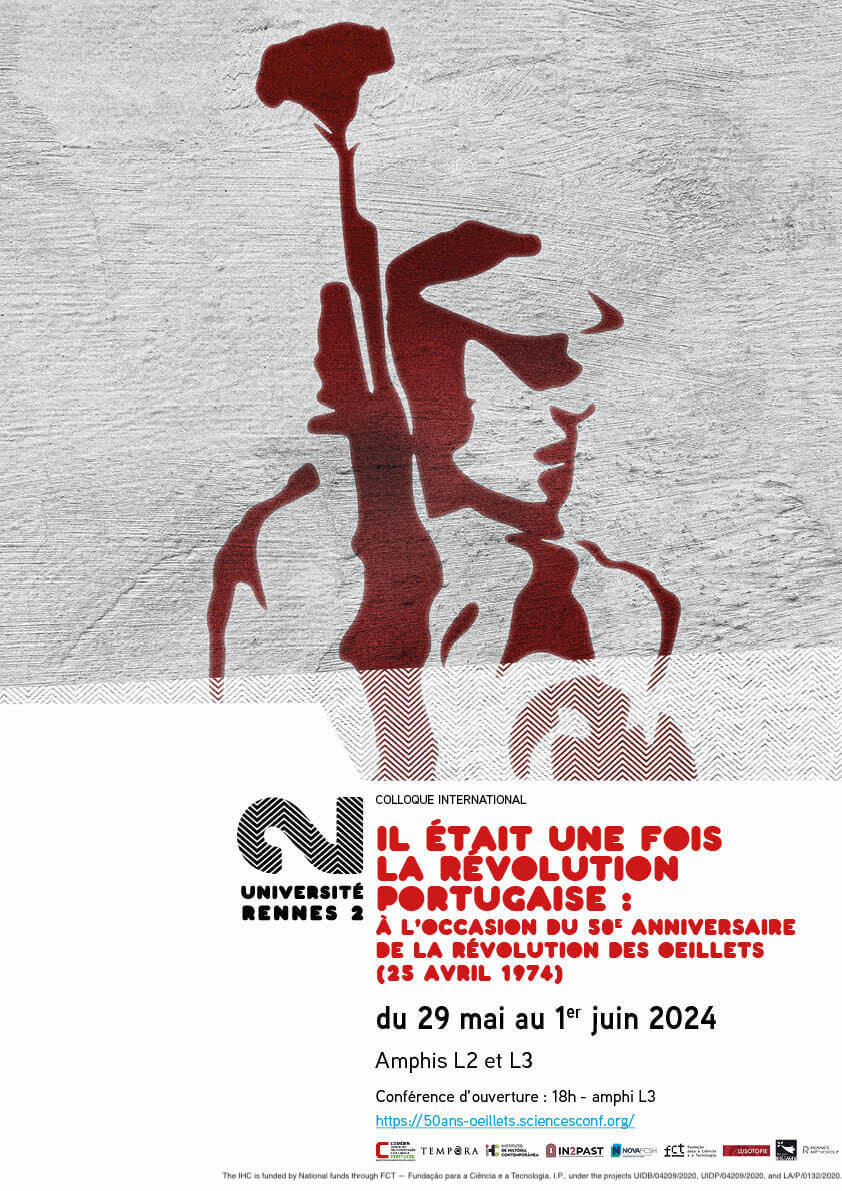maio, 2024

Detalhes do Evento
Colloquium that aims to reflect on the multiple meanings of the 25th of April 1974, thus enriching the historical understanding of the events in its multiplicity. Il était une
Ver mais
Detalhes do Evento
Colloquium that aims to reflect on the multiple meanings of the 25th of April 1974, thus enriching the historical understanding of the events in its multiplicity.
Il était une fois la révolution… portugaise:
à l’occasion du 50e anniversaire de la Révolution des œillets (25 avril 1974)
On the night of 24 April 1974, the “Capitães de Abril” initiated a coup underpinned by a simple programme – the “three Ds”: decolonize, democratize, and develop. Above all, they were driven by the desire to end a colonial war that had dragged on for fourteen years and could not be won militarily. It had isolated Portugal on the international stage, absorbing almost half the state budget, and driven young people into exile to avoid the draft. The regime fell the next day, amid an outbreak of popular joy. While the military called for calm and for people stay at home, the massive demonstrations of 1 May 1974 showed that the coup had turned into a revolution, first on democratic themes, then rapidly on social, even socialist themes.
The University of Rennes 2, with the support of the Camões Institute and the Mário Soares Chair (named in honour of its former professor and first honoris causa doctor) could not fail to commemorate this great event. In association with the journal Lusotopie and a range of institutional partners, it will host an international colloquium dedicated to the 25th April, from 30 May to 1 June 2024.
Keynote speaker: Maria Inácia Rezola (Comissão Executiva Comemorativa dos 50 anos do 25 de Abril / ESCS — IPL)
Call for papers
The 25th of April is a historical event with multiple meanings, that has given rise to scholarship from multiple fields. The colloquium will seek to reflect this multiplicity, bringing together papers that use different methodological approaches from a variety of disciplines. Four approaches will be privileged:
1 – THE INTERNATIONAL DIMENSION OF THE CARNATION REVOLUTION. The unique result of anti-colonial struggles in Africa combined with a growing weariness among the Portuguese with a regime that made less and less sense to younger generations, the Carnation Revolution had a considerable impact in many countries. Youth from across Western Europe went to Lisbon on “revolutionary tourism” to “see the revolution.” The 25th April also had an impact on communities and states linked with Portuguese history. Among many questions, the following can be asked: what were the Carnation Revolution’s repercussions and effects on the Portuguese communities that had emigrated to Western Europe, Canada, the United States, Brazil, and Venezuela, among other places? How did Eastern European countries initially react? How did countries that had come into conflict with colonial Portugal (such as India in 1961 during the seizure of Goa), or that supported the Portuguese anti-fascist and anti-colonialist resistance (such as Morocco and Algeria) experience the outbreak and development of the revolution? How did countries that supported the Portuguese colonial effort (such as Apartheid-era South Africa, South Rhodesia, or, in more complex ways, Brazil under the military, or Spain under late Francoism) react? And how did those who insisted on negotiations (such as Senghor’s Senegal) react?
2 – THE NATIONAL DIMENSION OF THE CARNATION REVOLUTION. Thinking about the 25th of April as a national fact, as a nation that speaks to itself, is so central that most of the time it is not done. The nation, largely identified with a “one nation, from Minho to Timor” Salazarist discourse and an exaltation of “Portugueseness,” had bad press in the spring of 1974, discredited by nearly half a century of dictatorship and the colonial wars. Europe then quickly appeared as a convenient substitute, under the slogan “The empire is dead, long live Europe!” Fifty years on, we can question the interactions between 25th of April and the Portuguese nation, and do so from a political and ideological angle, analysing the end of “a certain idea of Portugal” and the “historical moment when the people became the People” (Pascal Ory, Qu’est-ce qu’une nation?, Paris, Gallimard, 2020). Did 25th April profoundly change the image the Portuguese – at least subsequent generations – have of their own nation? Has Europe erased a certain nostalgia for the Empire? What challenges has Europe, with its vast size and population, brought to a country that is once again a “little metropolitan rectangle”? Has the extraordinary modernization of the country weakened attachment to the motherland?
3 –A PROCESS WITH MULTIPLE AGENTS. A decade after the 25th of April, new perspectives emerged that contributed to changing the dominant prism through which the revolution was viewed as an overthrow of the dictatorship exclusively enacted “top down” by military or political elites. Scholarship analysed the revolution from the point of view of the social forces involved, especially agrarian and urban conflicts. Various works helped to place the Portuguese case at the centre of international debates on democratization. More studies looked at the role of various oppositions in eroding the New State in its final phase. The “Revolutionary process under way” (PREC) began to be seen as part of a broader cycle of protest, which ran through universities, factories, the countryside, and the arts, helping to create the social, cultural, and political environment from which the MFA and its programme emerged. How did these dynamics influence the memory, identity, organization, and repertoire of action of Portuguese social movements in subsequent years, as well as their relationship with other political and social actors (institutional or otherwise)? What was the impact of the PREC social movements on the construction of collective memory in Portugal (about the colonial past, the dictatorship, and the revolution itself)? What legacies did these movements leave on the organization and perception of space in Portugal, for example in relation to the city and urban planning, or to housing, environmental and land rights?
4 – THE 25TH APRIL, BETWEEN MEMORY AND HISTORY. The politically marked character of the memory of the 25th of April is an aspect of the revolution’s national dimension mentioned above. An outside gaze, less attentive to recent Portuguese history, may be unaware of the political and ideological rifts that the memory of the events of 1974 and 1975 has nurtured in Portugal to this day, prolonging the cleavages of the time. The fact that most Portuguese citizens were now born after 1974 does not necessarily erase them, since the memory of the revolution, whatever it means, is the object of intergenerational transmission. The way the date has been commemorated for the last fifty years, changing with the political colours of the governments and the social aspirations of each period, also allows us to illustrate this phenomenon. There are clearly methodological and ethical questions on the relationship between history and memory to be posed here. Are there signs that, fifty years on, 25th April is finally entering history? Or, is the question misplaced? Have historians begun to be more attentive to the legitimate social demands for other ways of dealing with the
past? If so, what is the impact of current post-colonial questioning on the memory of the event and on the way of writing its history?
Proposals, which may be submitted individually or in the form of a workshop (max. five speakers), must be between 3,000 and 3,500 characters long (including spaces) and be written in one of the three languages of the conference (French, Portuguese or English). They must be sent before 15 December 2023 to the conference e-mail address: colloque25avrilrennes@gmail.com.
Responses to proposals will be given by 31 January 2024. Candidates whose proposals are accepted will be invited to seek funding from their home institutions for travel and accommodation expenses in Rennes. The Colloquium organisers will be able to cover part of these expenses, within the limits of the available budget.
>> 📎 Download the call for papers (PDF) <<
Organising Committee
André Belo, Université de Rennes 2, France
Michel Cahen, CNRS/Sciences Po Bordeaux, France
Irène Dos Santos, URMIS-CNRS, Paris, France, editor-in-chief of the journal Lusotopie
George Gomes, Université de Rennes 2, France
Yves Léonard, Centre d’histoire de Sciences Po Paris, France
Pedro Aires Oliveira, IHC — NOVA FCSH / IN2PAST, Portugal
Scientific Committee
Guya Accornero, ISCTE – IUL, Lisboa, Portugal
André Belo, Université de Rennes 2, France
Marc Bergère, Université de Rennes 2, France
Michel Cahen, CNRS/Sciences Po Bordeaux, France
Irène Dos Santos, URMIS-CNRS, Partis, France,
editor-in-chief of the journal LusotopieGeorge Gomes, Université de Rennes 2, França
Yves Léonard, Centre d’histoire de Sciences Po Paris, France
Maria José Lobo Antunes, ICS – Universidade de Lisboa, Portugal
Rita Luís, IHC — NOVA FCSH / IN2PAST, Portugal,
Paulo de Medeiros, English and Comparative Literary Studies, Warwick University, United Kingdom
Pedro Aires Oliveira, IHC — NOVA FCSH / IN2PAST, Portugal
Victor Pereira, IHC — NOVA FCSH / IN2PAST, Portugal,
Maria Inácia Rezola, Comissária Executiva para as Comemorações do 25 de Abril, IHC — NOVA FCSH / IN2PAST, Portugal
Philip Rothwell, European Humanities Research Centre, Oxford University, United Kingdom
Luís Trindade, IHC — NOVA FCSH / IN2PAST, Portugal
Tempo
Maio 29 (Quarta-feira) 5:00 pm - Junho 1 (Sábado) 1:30 pm
Organizador
Several Institutions

